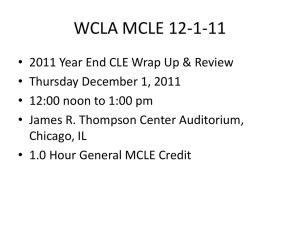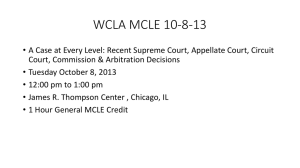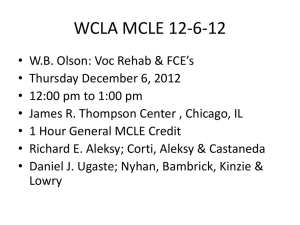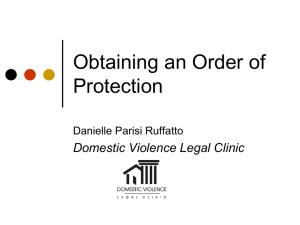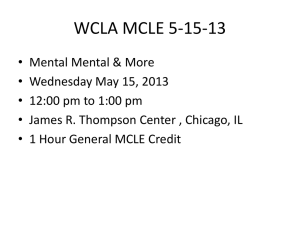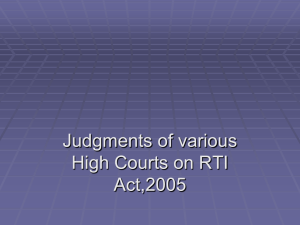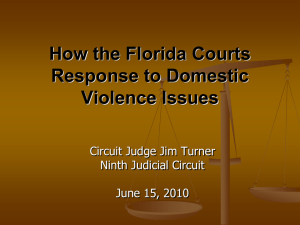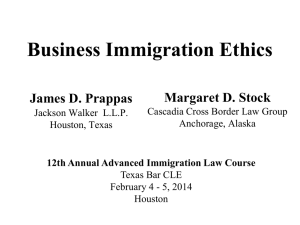Document
advertisement
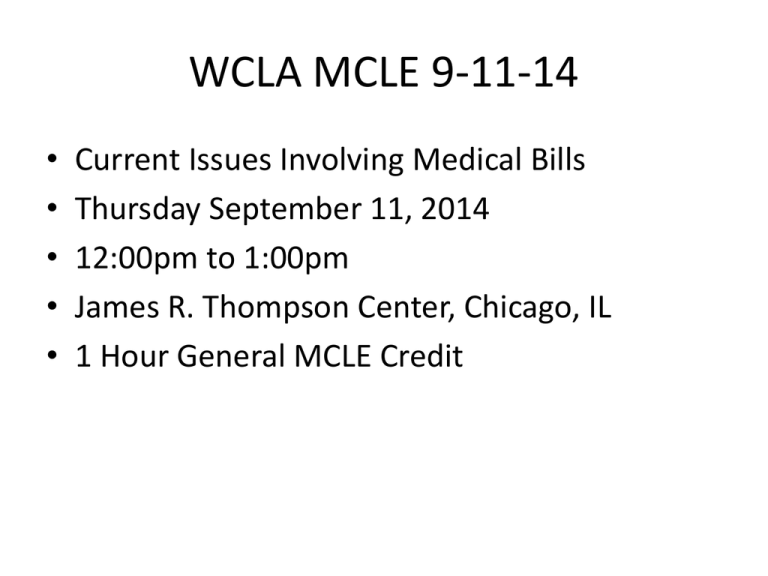
WCLA MCLE 9-11-14 • • • • • Current Issues Involving Medical Bills Thursday September 11, 2014 12:00pm to 1:00pm James R. Thompson Center, Chicago, IL 1 Hour General MCLE Credit 2011 Ill. HB 1698 Enacted June 28, 2011 P.A. 97-18 Section 8.2 – Balance Billing (e) Except as provided in subsections (e-5), (e-10), and (e-15), a provider shall not hold an employee liable for costs related to a non-disputed procedure, treatment, or service rendered in connection with a compensable injury. The provisions of subsections (e-5), (e-10), (e-15), and (e-20) shall not apply if an employee provides information to the provider regarding participation in a group health plan. If the employee participates in a group health plan, the provider may submit a claim for services to the group health plan. If the claim for service is covered by the group health plan, the employee's responsibility shall be limited to applicable deductibles, co-payments, or co-insurance. Except as provided under subsections (e-5), (e-10), (e-15), and (e-20), a provider shall: not bill or otherwise attempt to recover from the employee the difference between the provider's charge and the amount paid by the employer or the insurer on a compensable injury, or for medical services or treatment determined by the Commission to be excessive or unnecessary. (e)5- if denied claim, can seek payment of actual charges unless notified (e)10 – can seek remainder of bill up to negotiated rate or fee schedule, which ever is less, no collection when notified (e)15 – can mail reminders of bills due, request updates, no collection unless employee non-compliant (e)20 – upon final award/judgment, provider can collect; compensable treatment may be subject to payment rate not greater than lesser of f/s or actual charge; payment for services deemed not covered or compensable is the responsibility of the employee unless a provider and employee have agreed otherwise in writing; services not covered or not compensable are not subject to the fee schedule. Hernandez v. Illinois Tamale Co. 09 WC 20325, 09 WC 45959 (Jan. 16, 2013) Appendix A Factual Background Date of Accident: 1/29/09 (pre-amendment) assigned to clean chairs, slipped and fell on soapy water, injuring buttocks and both hips. Felt pain in her lower back, finishes her shift but does not report her work injury that day or the next day. Upon returning to work Monday, she reports her injury to her supervisor. Begins medical treatment on 2/2/09 (pre-amendment) with ErgoMedica and is diagnosed with thoracolumbar strain and contusion. She is prescribed medications and eventually transitions to a home exercise program. Treatment ends on 2/11/09. In March 2009, Petitioner is let go from Illinois Tamale for unrelated reasons. Petitioner testifies she worked full duty for various employers after she was let go and while she was in treatment. Petitioner re-enters treatment at some point in April 2009. The Arbitrator noted that Petitioner had undergone an MRI on 4/21/09 showing mild scoliosis, and L5-S1 mild posterior disc bulge without significant spinal stenosis or significant neural foraminal narrowing. The record also noted that Petitioner, at some point, had come under the care of Marque Medicos and underwent four (4) injections with Dr. Chundura at Marque Medicos and continued treatment until January 2010. On 5/11/09, Petitioner undergoes Sec. 12 exam. Physical exam showed full range of motion, negative straight leg raising and the MRI was interpreted as showing degenerative changes. Dr. Trotter opines that Petitioner suffered a sprain/strain as a result of the 1/29/09 accident and that Petitioner had achieved maximum medical improvement and that she could work full duty. Award Trial held 1/16/13, decision issued 1/16/13. Temporary Total Disability: none based upon Petitioner's testimony that she worked full duty while in treatment and based on the opinions of Dr. Trotter, Section 12 examiner that Petitioner could work full duty without restrictions. Nature and Extent: Based on Petitioner's testimony and the findings of the Section 12 examining doctor, 6% MAW awarded. Medical Treatment and Bills: Arbitrator finds that Petitioner was entitled to medical care from ErgoMedica and medical care from Marque Medicos through 5/11/09, the date of Petitioner's section 12 exam. The Arbitrator adopts the opinions of Dr. Trotter that additional medical treatment subsequent to 5/11/09 was not necessary. Regarding medical care subsequent to the Section 12 examination, the Arbitrator found that such “medical care was neither necessary nor causally-related to the January 29, 2009 accident . . . The Arbitrator denies all medical expenses incurred subsequent to the Independent Medical Examination. Neither Petitioner nor Respondent shall be liable for these bills.” Hernandez v. Illinois Tamale Co. 09 WC 20325, 09 WC 45959 (Jan. 16, 2013) Appendix A Legal Issues - No express statement in the Arbitration award that treatment was excessive or unnecessary under Section 8.2(e). Implied use of Section 8.2(e) when there is a finding that treatment is unnecessary and/or neither party is responsible? - Amendment language applicable to pre-amendment medical treatment? No express limitation. Cf. Section 8.7 Utilization Review: “The changes to this Section made by the amendatory act of the 97 th General Assembly apply only to health care services provided or proposed to be provided on or after September 1, 2011.” Cf. Section 11: “The changes to this Section made by Public Act 97-18 apply only to accidental injuries that occur on or after September 1, 2011.” - Retroactive application? Constitution of the State of Illinois, Art. I, Sec. 16 - No ex post facto law, or law impairing the obligation of contracts or making an irrevocable grant of special privileges or immunities, shall be passed. Section 8(a): “The employer shall provide and pay the negotiated rate, if applicable, or the lesser of the health care provider’s actual charges or according to the fee schedule, subject to Section 8.2, in effect at the time the service was rendered for all necessary first aid, medical and surgical services, and all necessary medical, surgical and hospital services thereafter incurred, limited, however, to that which is reasonably required to cure or relieve from the effects of the accidental injury.” Practice Pointers - Define the scope of representation early on - Anticipate and outline all possible outcomes - Litigation strategy Marque Medicos Fullerton, LLC and Medicos Pain & Surgical Specialists, S.C. v. Bertha Hernandez 2013 L 014071 Appendix B • • • • Breach of Contract claim against Hernandez Allegations: Hernandez received treatment from 4/15/09 – 1/19/10, that Plaintiffs had not received full payment for services and that Defendant did not negotiate a settlement for outstanding medical bills, that Defendant had signed certain documents agreeing to pay for treatment whether or not covered by insurance, that demands for payment had issued to Defendant. That Hernandez had signed written agreements with Plaintiffs to be personally responsible for Plaintiff’s charges Damages: $56,379.92 to Marque Medicos Fullerton, LLC and $51,119.00 to Medicos Pain & Surgical Specialists, S.C. Notes • Does a provider have a basis to sue a former patient where the Commission has found treatment to be unnecessary and further found Petitioner not liable for payment of that treatment? Should a provider be notified of trial and subsequent awards? • What is the scope of representation on behalf of Petitioner in a subsequent circuit court action? • What strategies should parties develop? Tiburzi Chiropractic v. Kline 996 N.E.2d 1164, 375 Ill. Dec. 108 (4th Dist. 2013) Appendix C Factual Background Petitioner David Kline is injured at work in October 2008 while working for Rovey Seek Company, Inc. (08 WC 050971). Files a claim and receives treatment from Tiburzi Chiropractic. Workers compensation claim settled on August 2, 2010: 25% MAW and the employer agreed to satisfy pursuant to the fee schedule “all medical bills for medically necessary causally related treatment received on or before June 10, 2010” under the terms of settlement. Employer makes partial payment on Tiburzi’s bill based on UR, which was conducted after settlement contracts were approved, refuses to pay Tiburzi under the terms of the lump sum settlement contract March 2011 – Tiburzi files small claims suit alleging breach of contract against employee Kline May 2012 – Petitioner files a 19(g) petition in circuit court for judgment against employer for non-payment of related medical expenses. Circuit court finds that the employer had made full payment pursuant to the terms of the original settlement contracts and pursuant to Section 8 of the Act. Trial Court Ruling November 2012 bench trial held on Tiburzi’s suit against Kline. Evidence showed that the insurance company had paid $990 toward the $3,000 in charges and that payments were based on the UR conducted after settlement was reached in the underlying workers compensation case. Tiburzi argued that the private pay agreements of the parties superseded the fee restrictions of the Act in that the Act did not apply in the context of the parties’ contractual relationship and was allowed by the Act. Finding that Tiburzi and Kline had a valid and enforceable pay agreement that was controlling “if allowed under the law.” Trial court awards Tiburzi $2,010.00 for past due unpaid medical bills and another $145.00 in court costs. Kline appealed. Appellate Court Ruling - Defendant Kline argued that the trial court erred in awarding Tiburzi unpaid medical bills because those bills were subject only to the Act. Tiburzi argued that Section 8.2 (e-20) supports the trial court’s ruling that non-compensable bills could be collected from the patient directly. Tiburzi Chiropractic v. Kline 996 N.E.2d 1164, 375 Ill. Dec. 108 (4th Dist. 2013) Appendix C Appellate Court Ruling Defendant Kline argued that the trial court erred in awarding Tiburzi unpaid medical bills because those bills were subject only to the Act. Tiburzi argued that Section 8.2 (e-20) supports the trial court’s ruling that non-compensable bills could be collected from the patient directly. - 8.2 (e-20) “Upon a final award or judgment by an Arbitrator or the Commission, or a settlement agreed to by the employer and the employee, a provider may resume any and all efforts to collect payment from the employee for the services rendered to the employee and the employee shall be responsible for payment of any outstanding bills for a procedure, treatment, or service rendered by a provider as well as the interest awarded under subsection (d) of this Section. In the case of a procedure, treatment or service deemed compensable, the provider shall not require a payment rate, excluding the interest provisions under subsection (d), greater than the lesser of the actual charge or the payment level set by the Commission in the fee schedule established in this Section. Payment for services not covered or not compensable under this Act is the responsibility of the employee unless the provider and employee have agreed otherwise in writing. Services not covered or not compensable under this Act are not subject to the fee schedule in this Section.” - Appellate court held that 8.2(e-20) does not allow for provider to recover for compensable services in excess of the fee schedule but that the provider could recover for services “not compensable.” In this case, the insurance carrier had paid nothing for the 20 cold packs, each billed in the amount of $10. Therefore, Tiburzi Chiro was entitled to judgment in the amount of $200 plus costs. - Interestingly, only $200 of the remaining unpaid $2,010.00 was awarded by the Appellate Court. No discussion was made on why the other $1,810.00 was not awarded to Tiburzi in its modified decision. Notes • Does 8.2(e-20) language square with the new language added to 8.2(e)? How should parties tailor proposed decisions to these provisions? • Does a provider have a breach of contract, as an intended beneficiary of the contract, claim against a Respondent when bills are unpaid pursuant to terms of settlement? (See, Appendix C-1) • If a provider sues a Respondent, what is the scope of representation in those actions? (See, Appendix C-1) Martin Mota v. Labor Network 11 WC 28693 (Apr. 1, 2013) Appendix D Factual Background • DA 7/6/11 (Order listed date of accident as 7/6/13) • 28 year old packer • Injured when lifting 20 50 pound bags and felt a sharp pain in his low back when lifting the last bag • Petitioner treats at Physician’s Immediate Care where he is diagnosed with a lumbar and thoracic strain. He is returned to work at light duty and is accommodated. • Petitioner seeks his own treatment with Dr. Riera who recommended an MRI. The MRI is read to show L5/S1 disc herniation. An EMG is performed which suggested an L5/S1 radiculopathy. An injection is performed. • Petitioner undergoes Section 12 exam by Dr. Singh. Singh reads MRI as showing signal loss but disagrees that there is herniation. Singh notes symptom magnification and recommends light duty. No additional care is recommended. • Petitioner follows up with his doctors and is eventually referred to Dr. Erickson, who recommends lumbar surgery. • The parties agree to submit to a third party examination. Petitioner is seen by Dr. Avi Bernstein, who questioned the possibility of Waddell signs and did not agree Petitioner was a surgical candidate. An FCE was recommended. 19(b) Award • Petitioner’s current condition is casually related, treatment is to be authorized. • Respondent is given credit for TTD and TPD paid • Respondent is given credit for medical benefits paid and shall hold Petitioner harmless • Respondent is to pay Petitioner past due TTD • Respondent shall pay reasonable and necessary medical services of $82,323.88 as provided in Sections 8(a) and 8.2 of the Act. Martin Mota v. Labor Network 14 IWCC 04592 (Jul. 18, 2014) Appendix D • • • • Petition for Review filed by Respondent Modifies the decision of the Arbitrator and otherwise affirms and adopts the decision of the Arbitrator Temporary Total Disability – vacates the award after 10/29/12, the date in which Petitioner underwent his FCE, finding that the FCE showed Petitioner could work light duty, that Respondent’s evidence showed it had light duty available and that Dr. Erickson still removed Petitioner off of work. Medical Expenses – award vacated and modified. – Determined that no medical expenses should be awarded after 9/16/12, the date in which Dr. Bernstein issued his Section 12 report. – Medical benefits (two lumbar epidural steroid injections) prior to 9/16/12 were neither reasonable nor necessary based upon the retrospective UR reports. – The Commission found that the treatment rendered by the providers after 9/16/12 was unreasonable and unnecessary and that the epidural steroid injections performed by Dr. Vargas on 2/22/12 and 4/28/12 were neither reasonable nor necessary. – “Pursuant to Section 8.2(e) of the Act, neither the Petitioner nor the Respondent are to be held liable for the costs of treatment the Commission has determined to be unreasonable and unnecessary.” • Commission orders that Respondent pay to Petitioner the sum of $82,323.88 for medical expenses Horacio Perez v. Metro Staff, Inc. 11 WC 013255 (Feb. 19, 2013) Appendix E Factual Background • D/A: November 15, 2010 (pre-amendment) • 26 y/o temporary laborer assigned to work at packing factory • Petitioner alleged a back injury following lifting a 45 pound box and that he felt a pulling sensation and immediate pain. • Petitioner is seen by company clinic, given light duty and physical therapies. An MRI is ordered showing DDD, protrusions and mild left lateral recess and neuroforaminal stenosis at L4-5 and borderline left neural frontal stenosis at L5-S1. Company clinic refers Petitioner to Dr. Babak Lami, who opines Petitioner is not a surgical candidate and who prescribed an HEP. Petitioner is released from company clinic. • Petitioner begins treatment with Marque Medicos March 2011. An EMG is done showing evidence of denervation and reinnervation of the left S1 nerve root. Petitioner undergoes one left L5 and S1 transforaminal ESI which provides temporary relief. Petitioner is seen by Dr. Erickson who recommends surgery. Surgery is performed 6/29/11 and Petitioner is released to full duty on 12/13/11. Award • Causal relationship between accident and the onset of symptoms and subsequent condition of ill being, relying on the opinions of Dr. Erickson over those of Dr. Ryon Hennessy and Dr. Olash, Respondent’s UR doctor. • Medical: Respondent found liable for all unpaid medical bills related to the injury, specifically including treatment from Elite PT, Dr. Erickson, Lake County Neurosurgery, Prescription Partners, Specialized Radiology, Quest Diagnostics, Marque Medicos, Marque Medicos Pain & Surgical Specialists and Ambulatory Surgical Care Facility. • TTD: 5/17/11-12/13/11 • Nature and Extent: 22.5% MAW, no impairment rating offered by either side as noted (pre-amendment injury). Horacio Perez v. Metro Staff, Inc. 14 IWCC 0533 (Jul. 7, 2014) Appendix E Review • Petition for review filed by Respondent • Modifies the decision of the Arbitrator but otherwise affirms and adopts the decision of the Arbitrator • Finds that Petitioner failed to prove that $4,758.00 in transportation charges were reasonable and necessary medical expenses. • Reduces award for medical expenses by $4,758.00 but remaining bills are to be paid pursuant to Section 8.2 of the Act. Notes • No specific reference to 8.2(e) – is that required? • 8.2(e) standard requires only a finding of excessive or unnecessary medical services or treatment • No specific finding that neither Petitioner or Respondent liable – is that required or simply implied by virtue of stating transportation was not proven as reasonable or necessary? Maria Gomez v. Speedway Super America LLC 11 WC 003723 (Jun. 10, 2013) Appendix F Factual Background • D/A 1/10/11. • 39 y/o stocker / deli worker at gas station. • Alleged injury to her lower back after lifting a 30 pound box of chicken onto a work table. Reported increasing low back pain and numbness going down her leg. • On 1/28/11, Petitioner completes an accident report and is seen at MacNeal ER. MacNeal noted a lifting injury at work with pain doing down left thigh. Light duty and medications are issued. • On 1/31/11, Petitioner begins treating with Alivio Physical Therapy Chiropractic. An MRI is ordered showing no significant spinal stenosis or foraminal stenosis seen, mild left paracentral and foraminal disc protrusion is seen at the level of L1-2 and mild central disc protrusion at L4-5. Petitioner continues to treat with Alivio, who on 6/6/11 notes improvement, decreased pain in her lower back and that Petitioner “felt no pain today.” Alivio goes on write that from a conservative management point of view, patient had reached MMI. • On 5/13/11, Petitioner attends Section 12 exam with Dr. Goldberg, who noted normal exam findings. He read the MRI to show no significant pathology and only mild disc protrusions. He concludes that Petitioner suffered a lumbar strain, recommends no further care and places her at MMI. • On 6/6/11, Petitioner has initial consultation with Dr. Ronald Michael, who noted back pain worse than her bilateral leg pain, that pains were severe with sitting, standing and walking, he noted numbness and tingling bilaterally in the lower extremities. • On 9/16/11, Dr. Goldberg issues addendum report stating injections were not necessary, no change in opinion • On 11/10/11, Petitioner underwent posterior lumbar interbody fusion with hardware and discectomy Maria Gomez v. Speedway Superamerica LLC 11 WC 003723 (Jun. 10, 2013) Appendix F (continued) • On 2/27/12, Petitioner is seen by Dr. Carl Graf for another Section 12 exam. The doctor concludes multiple inconsistencies, no disc herniation on MRI and no acute findings. He concludes that any and all care and treatment was not related to an injury. • Respondent produces UR reports decertifying injections, discogram, surgery and work conditioning. Award • Arbitrator finds Petitioner sustained an accident • Causal connection: find that Petitioner reached MMI for the accident as of 6/6/11, relying on the opinions of Dr. Goldberg, Dr. Graf and that of Dr. Barnabas, who at the 6/6/11 Alivio visit placed Petitioner at MMI. The Arbitrator found the 6/6/11 visit inconsistent with Petitioner’s visit on that same date with Dr. Michael, who noted severe low back pain. • Medical Expenses: awarded up through 6/6/11, the date of MMI. Maria Gomez v. Speedway Superamerica LLC 14 IWCC 0444 (Jun. 6, 2014) Appendix E Review • Petition for Review filed by Petitioner • Modifies the decision of the Arbitrator and otherwise affirms and adopts the Decision of the Arbitrator. • Specifically finds that all treatment, including but not limited to, treatment with Dr. Harsoor, Alivio, Rogers Park One Day Surgery Center, Dr. Michael, Metro South, Oak Park Medical Center was excessive and unnecessary. • Pursuant to Section 8.2(e), these providers shall not bill or otherwise attempt to recover from the Petitioner for medical services or treatment that have been determined to be excessive or unnecessary. • In support of this specific finding, the Commission relies on the reports of Drs. Goldberg, Graf and the utilization review reports. • The Commission discusses at length the medical evidence suggesting additional care and surgery was not medically indicated and finds Dr. Michael’s medical opinions unsupported by the evidence. Notes • Specific reference to Section 8.2(e) in support of its decision to hold harmless both parties • The Commission decides against the providers for treatment prior to 9/1/11. Again, is this retroactive application allowed?

